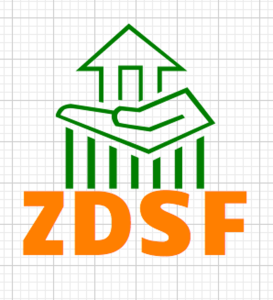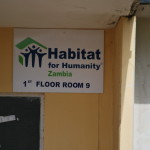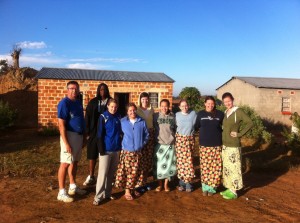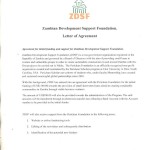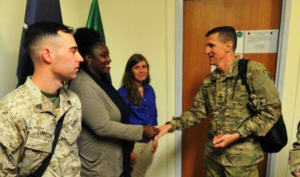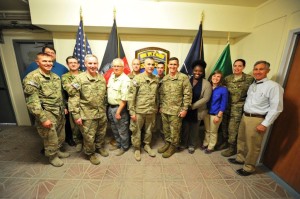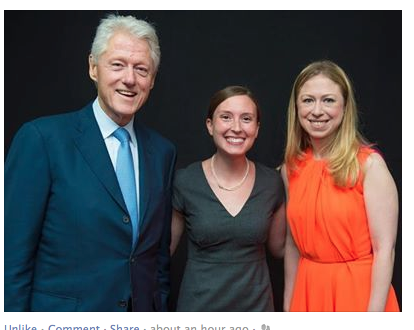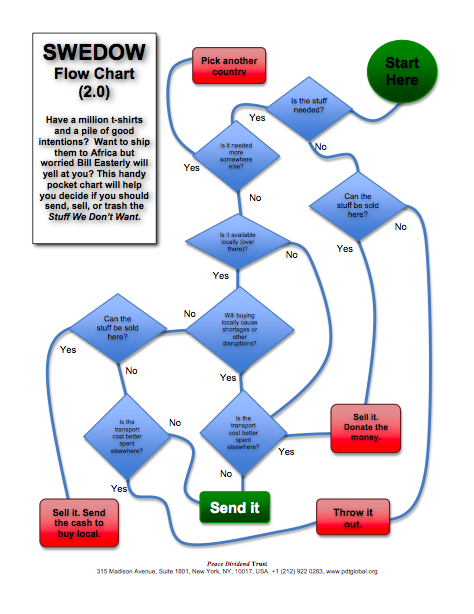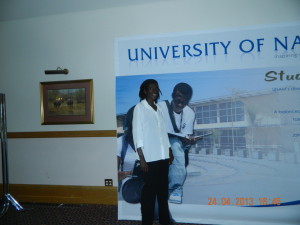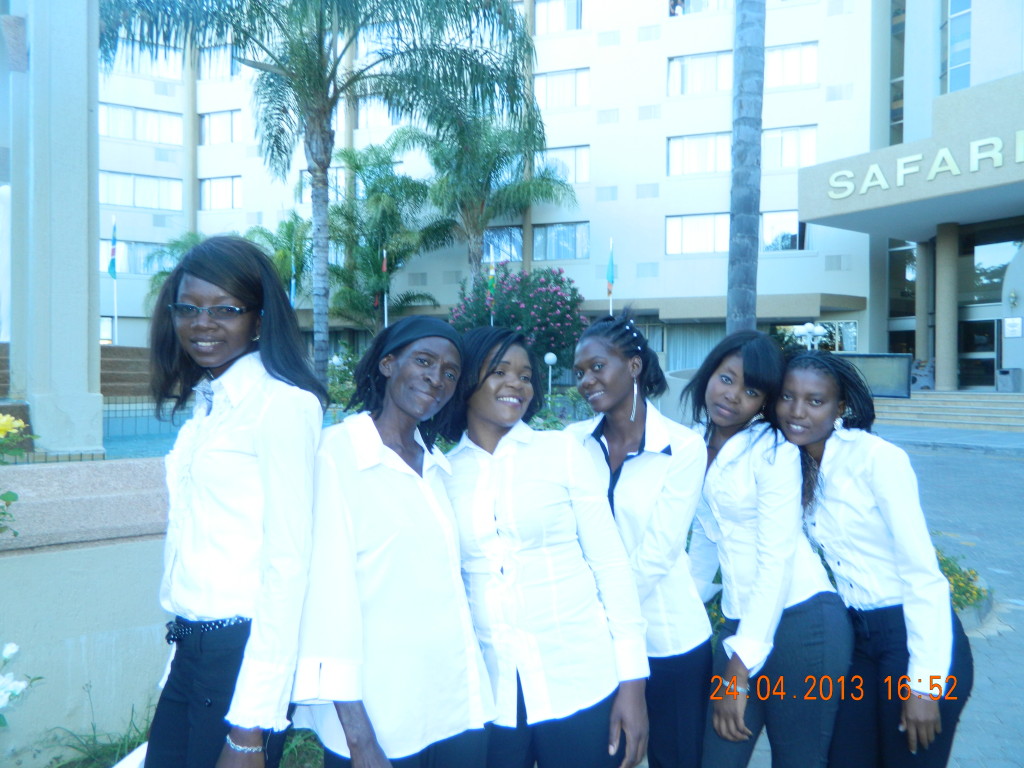Last Thursday, I was honored to be the keynote speaker at a Periclean Scholars event at Elon. It was the organization’s annual “Celebrate Periclean” event, attended yearly by current Periclean Scholars, prospective Pericleans, faculty mentors, and a few Periclean alumns. More than anything else I was involved with at Elon, the Periclean Scholars program significantly shaped my undergraduate journey and impacted my life in ways I never imagined it would. Before reading on, I urge you to watch this video, which my 2011 Periclean Scholar class compiled for a graduation event that was held in honor of Elon’s leadership organizations the night before our commencement in May 2011. Watching it again while I wrote my speech (text below) gave me chills, and reminded me why it is I care so deeply about civic engagement, local and global partnerships, and the amazing things that can happen when passion meets commitment.
*
It’s an honor to be speaking here tonight. Last night, I was at an alumni event called “Evening for Elon” in Washington, D.C., and I spent the majority of the evening talking with fellow Pericleans I hadn’t seen in a while. President Lambert spoke at the event, and in his speech, he talked a lot about identity and family. And I just grinned the whole time, because I knew I was coming to campus tonight to talk about the same things myself, and to share how the Periclean Scholars program helped define my identity, and gave me a few different families. So thank you for having me here.
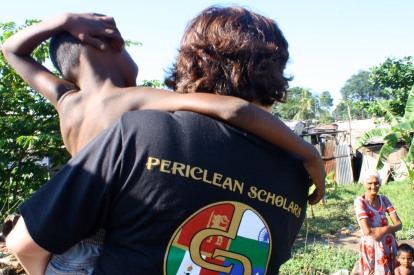
Dr. Crista at a land waste site outside of Colombo // January 2011
You’ve already heard all the class updates, and I’m sure you’re as impressed and proud as I am of all the things each Periclean class has accomplished lately. But I’d like to take a few minutes to speak a bit more personally. I’m going to talk primarily to the current and prospective Periclean Scholars here tonight. I’d like to share what’s in store for you, or at least what could be in store for you, in terms of your Periclean journey and especially in terms of family. Dr. Arcaro suggested I talk about what it’s like to go from being a starry-eyed Periclean inductee to a post-grad global citizen, but I’m still pretty starry-eyed about it all, so I think I’ll just stick with that.
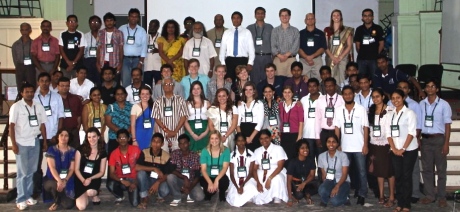
So, a little about my journey. I’m a 2011 Periclean, and my class focused our efforts on environmental education in Sri Lanka. Like many of the other 2011’s, what I knew about Sri Lanka when I applied to the Periclean program was that it was somewhere near India and had been ravaged by the 2004 tsunami. I had no concept of how much an island the size of West Virginia, halfway around the world, would come to shape my life. There’s no way I could have predicted that our Periclean partners would become like family to me, or that someplace so far away would come to ground me like nothing else has. I had no idea that just like how Elon became my home, in all the ways that word entails, Sri Lanka would become home, too. And that’s exactly what happened.
I first traveled to Sri Lanka with some of my fellow 2011’s during winter term of our senior year, where we spent an incredible month working on the ground with our Periclean partners. I returned to the island later in 2011, after graduation, when another Periclean, Jesse Lee, and I were invited to be the only two Americans at an international conference being sponsored by one of our Periclean partner organizations and the American Center of the U.S. Embassy. After the conference, Jesse and I traveled around Sri Lanka for three months, continuing our class’s work with our partners on the ground.
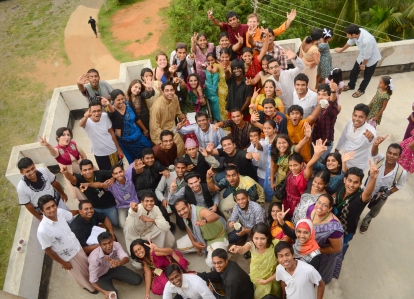
Training for Trusteeship conference in Kegalle, Sri Lanka // September 2011
And it was during that time that I applied for a Fulbright grant that took me to Sri Lanka once again the following year for another nine months. As a Fulbrighter, I taught English literature at a university outside of Colombo—an incredibly rewarding experience that I wouldn’t have had if not for Periclean.
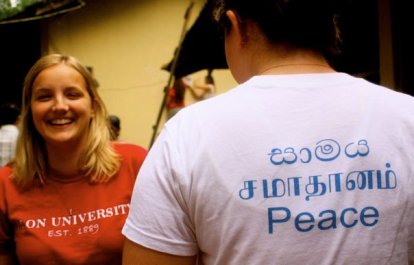
Which brings me back to my Periclean cohort. Looking back, it was more than fitting for our class to focus our efforts on environmental issues in Sri Lanka. And while a lot of the time we didn’t know exactly what we were doing, things really came together our junior and senior year.
One of the culminating efforts of our class was holding a large-scale environmental summit—which we called “Leaders in Environmental Advocacy Forum,” or LEAF—at the University of Colombo in Sri Lanka, bringing together environmentalists, policy makers, and students to discuss some of Sri Lanka’s most pressing environmental issues.
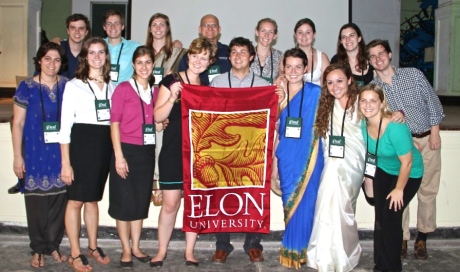
LEAF is a great example of something I think the Periclean program does extremely well—helping to emphasize each Scholar’s individual strengths. In every Periclean class, there is a multitude of different majors, skill sets, and passions. I remember having doubts that our class would be able to maintain a focus and come together, considering how different we were; I’m sure some of you current Pericleans have had similar doubts. We had Art majors, Poli Sci majors, Accounting majors, English majors, and so on. But somewhere in the middle of our junior year, as we continued to meet for our weekly Periclean classes, we began to see how our individual passions and skill sets, more than just our majors, were beginning to define our work as Pericleans. And that was empowering.
Chas Smith, for example, a 2011 I talked with at the Elon alumni event last night, was an Econ major who was always strangely interested in water. As a Periclean, he began intensely studying water issues in Sri Lanka, which helped inform our class’ efforts toward environmental education on the island. I’ll never forget sitting in a cold room in a little inn in Nuwara Eliya, Sri Lanka, surrounded by about fifteen fellow Pericleans, listening to Chas go on and on about Sri Lanka’s ancient water systems. He was able to use that knowledge in helping to make a short documentary—called “The Elephant in the Room”—that he and two other Pericleans, Jack Dodson ’12 and Jesse Lee ’11, produced about environmental issues in Sri Lanka. Chas now works on Capitol Hill, but water is still on his mind; he recently applied for a Fulbright fellowship that will (hopefully) take him to Oxford to continue studying water issues.
Chas is just one example of how the issues you’re drawn to study and focus on as a Periclean are often the things that continue to define your path after you’ve left Elon. While the Periclean program emphasizes partnerships with people in other countries, it also encourages personal growth and gives us Scholars the room and resources we need to become the most dedicated and passionate global citizens we can be.
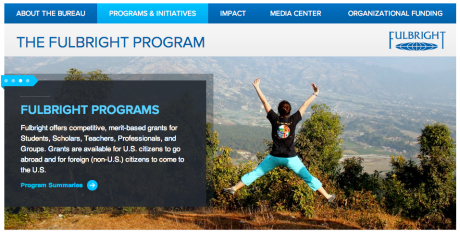
A picture of me in Kathmandu, Nepal, during a week-long Fulbright conference (kinda cool that Fulbright’s using the photo on their website!) I’m wearing my Periclean Scholars shirt and, as you can tell, am pretty excited about the view.
My experience as a Fulbright Fellow was part of that personal growth process that Periclean inspired. And while I was thrilled to be in this very academic role teaching at a university in Sri Lanka, my Fulbright experience was really shaped by the same things my Periclean experience was shaped by: the individuals in Sri Lanka who became my family there. The people who the class of 2011 partnered with, the scientists and environmentalists and change-makers and mothers and fathers, the people who opened their doors to our class and let us be a part of their lives. Those are the relationships this program strives to cultivate. That’s what makes this such a transformative experience.
But just having those relationships isn’t enough. It’s not enough to just reach out to an NGO in Haiti, or have a good conversation with a doctor in Ghana, or knock on a door in Chiapas. It’s about taking those relationships and making things happen, pulling together resources toward a common goal and common good. Periclean taught me how to do that, and it’s something I hope to do for the rest of my life.
Near the end of my Fulbright grant, two Sri Lankans that our class had gotten very close to and partnered with asked me to help them hold an English camp for 150 rural high-school students in Nuwara Eliya, Sri Lanka. Many of these students were the same ones that Jesse and I had taught while we were in Sri Lanka, bringing my Periclean/Fulbright worlds even more full-circle. Working with our Periclean partners (and good friends) Roshan and Chamindha as well as with the U.S. Embassy and my fellow Fulbrighters to organize and hold this camp was a privilege, and I’m so glad I had the chance to help pull together a program that meant a lot to the kids involved.
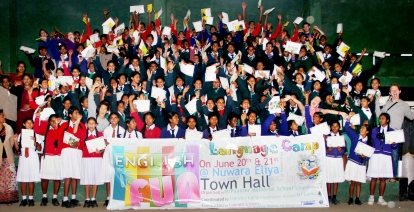
The English camp was a big success, and it was only possible because of the relationships that my fellow Pericleans had begun, relationships that I and other Pericleans are able to help sustain on very direct levels. And I think it’s these kinds of initiatives that illustrate how Periclean partnerships continue well past your time here at Elon, and how they can have a larger reach and impact than you probably ever imagined.
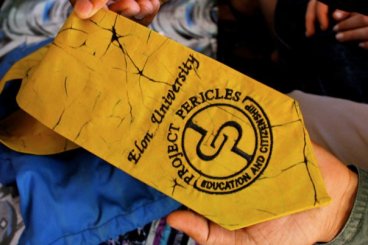
To wrap up and continue on this theme of relationships and family, I’m humbled to be able to say that three of my most influential Elon mentors are here tonight, and each are an integral part of the Periclean program. Bud Warner, Tom Arcaro, and Crista Arangala—or “Mom,” as the 2011’s like to call her—are more than just my biggest supporters and most inspirational role models; they’re my Elon family.
And they’re examples of the family that you’re going to be part of, or that you’re already a part of. I’m just one of so many Periclean Scholars who are able to say that this program and its people changed my life, and more importantly, helped me make positive changes in other people’s lives. So whether you’re a current Periclean, an aspiring Periclean, a potential Periclean—know that this is what is in store for you. This is the exciting, challenging, rewarding journey that is being a Periclean Scholar.
Thank you.
 I hope you are well! I wanted to let you know that Global Health Corps applications for the 2014-15 fellowship are NOW OPEN! I think that this fellowship would be an awesome fit for Periclean Scholars – both previous and graduating – given the cross-cutting themes in the missions of GHC and PS! Plus, I’d love to have another Elon alum in the program! 🙂
I hope you are well! I wanted to let you know that Global Health Corps applications for the 2014-15 fellowship are NOW OPEN! I think that this fellowship would be an awesome fit for Periclean Scholars – both previous and graduating – given the cross-cutting themes in the missions of GHC and PS! Plus, I’d love to have another Elon alum in the program! 🙂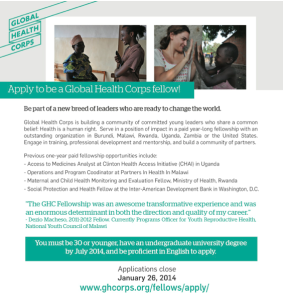
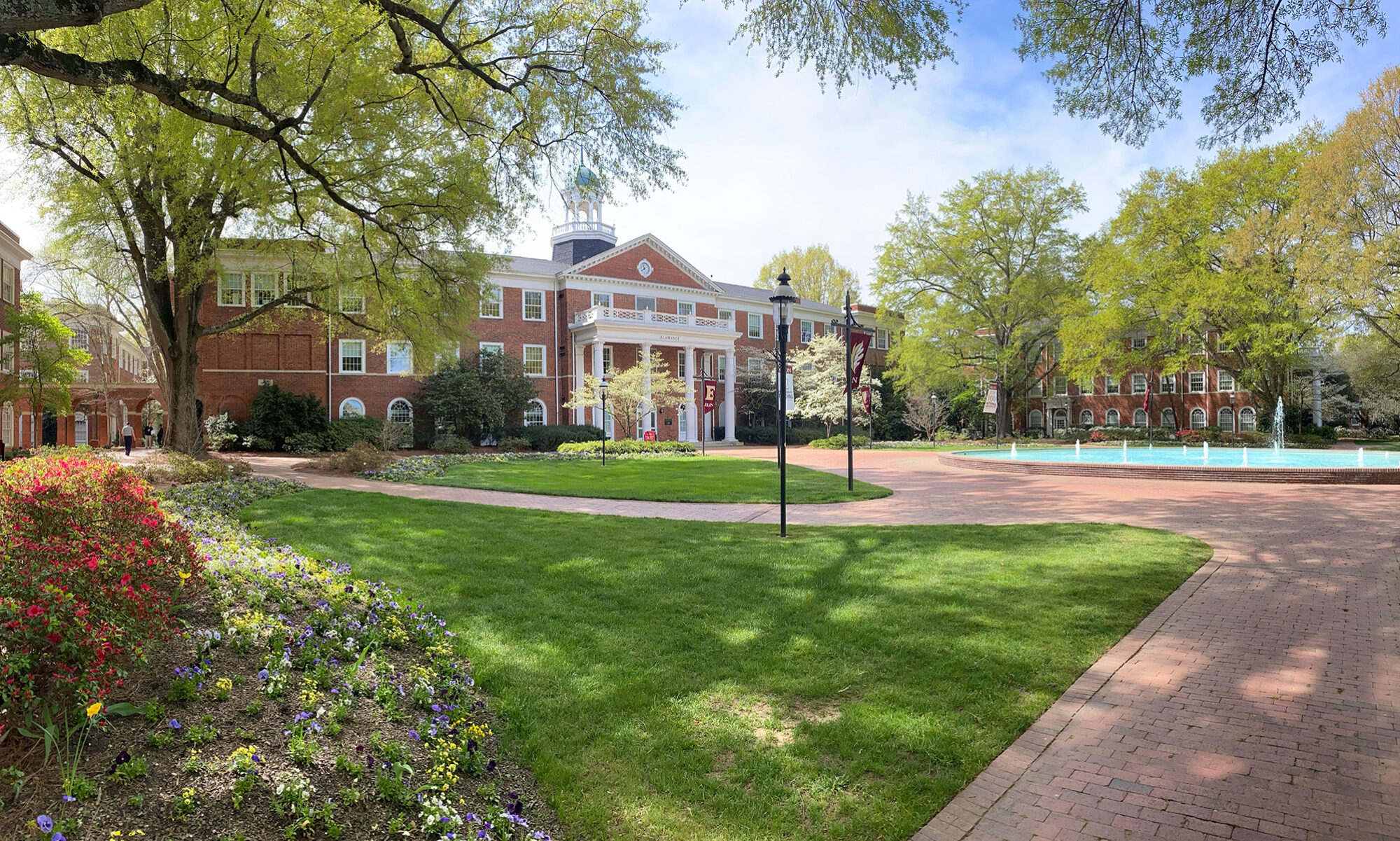

 Follow
Follow
